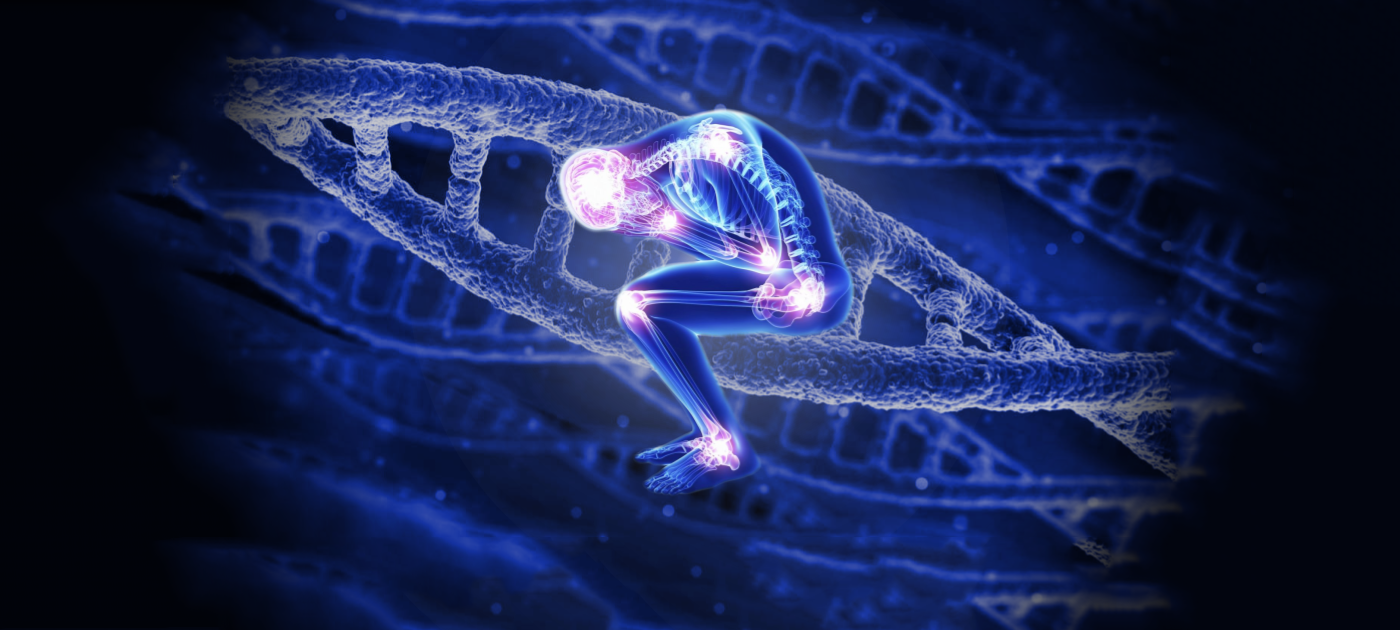In Brief:
- Pain is subjective and hard to treat
- People with Marsili Syndrome are less sensitive to pain but still feel normal sensations
- Researchers studying Marsili Syndrome are looking for treatments for chronic pain
Most of us have experienced pain and know the challenge of trying to find lasting relief. For six individuals in the Marsili family, injuries like fractures, sprains, and cuts don’t cause pain. Moreover, they can withstand higher and lower temperatures than the average person. These qualities seem worthy of the X-Men, but these people don’t have superpowers. A genetic mutation is the real cause of Marsili syndrome, named after the only family in the world believed to possess this trait.
Letizia Marsili, one member of this special family, expressed a positive attitude toward this mutation in an interview with the BBC. “From day to day we live a very normal life, perhaps better than the rest of the population, because we very rarely get unwell and we hardly feel any pain.”
In hopes of improving quality of life for other people, scientists are investigating this gene mutation. The Marsili syndrome is called a point mutation, where the DNA sequence is altered in only one location, the ZFHX2 gene. This unique change in the gene increases the patient’s tolerance for pain without changing sensitivity to harmless touch. Similar mutations, such as congenital analgesia, completely eliminate sensitivity to touch. These conditions can increase risk of serious injuries and undetected wounds. For example, if a person suffering from congenital analgesia suffers a burn, he or she will not feel the urgency to seek immediate treatment before the burn causes serious skin damage. Because the Marsili family members retain awareness of physical contact, their genetic mutation could be a key to finding effective and safe treatments for pain that do not reduce normal tactile sensations.
Current options for pain management have limitations. Painkillers can be a solution for acute pain, which is temporary. However, chronic pain, long-term pain lasting for more than six months, cannot be cured. Medications can numb the sensation for brief periods of time, but the pain will persist for as long as the trigger is present. Moreover, pain is subjective to the patient and not measurable on a definite scale, so prescribing painkillers can be challenging.
Dr. Anna Maria Aloisi, a professor and researcher at the University of Siena, saw a golden opportunity when one of the Marsilis came to see her without a jacket in the freezing weather. Eager to recreate the effects of the mutation, Dr. Aloisi conducted a series of tests in normal and genetically mutated mice to determine thermal and mechanical pain thresholds. Dr. Aloisi observed mice with the mutation to have a particularly high tolerance for heat. Most importantly, the mutation altered pain processing without changing sensitivity to harmless touch.
Results from tests in mice offer a key stepping stone to finding safer methods for pain relief. As scientists continue to study the precise effect of the mutation carried by the Marsili family, they may take advantage of concurrent advancements in gene manipulation to mimic low pain sensitivity in others. With substantial scientific research and a dash of luck, one family’s rare genetic mutation may benefit us all.
CONTENT EXPERT
Dr. Anna Maria Aloisi is an associate professor and Director of the Department of Physiology at the University of Siena in Italy. As a founder of the European Pain School and member of the International Association for the Study of Pain, she is highly involved in pain-related studies. Her works have been in over 200 publications. One of her most prominent studies is sex differences in pain and analgesia, specifically how different hormones produced in men and women affect sensitivity to pain and analgesia.
Works Cited
- “Chronic Pain: In Depth.” National Center for Complementary and Integrative Health, 21 Mar. 2018, nccih.nih.gov/health/pain/
chronic.htm . - Gabbatiss, Josh. “Family cannot feel pain due to rare genetic mutation.” Independent, 14 Dec. 2017, www.independent.co.uk/news/
science/italian-family-feel- .pain-cannot-rare-genetic- mutation-university-college- london-a8110556.html - Habib, Abdella M., et al. “A novel human pain insensitivity disorder caused by a point mutation in ZFHX2.” Brain, vol. 141, no. 2, 2018, pp. 365-376. University College London.
- “Gene mutation causes low sensitivity to pain: Rare mutation causes one family to have unusually low sensitivity to pain.” ScienceDaily, 13 December 2017, www.sciencedaily.com/releases/
2017/12/171213220128.htm . - Patel, Shalin. Personal interview by the author. 11 Aug. 2018.
- Aloisi, Anna Maria. Personal interview by the author. 6 Jul. 2018.
Image Credits:
Feature Image:
- DNA Wallpaper by Unknown (Edited). License: CC0 1.0
- Headache / Migraine With Joint Pain by Shubhangi Kene (Edited). License: CC0 1.0
Story Image:
Gene Mutations by Unknown (Edited). License: CC0 1.0
Chief Editor: Akila Saravanan
Creative Team Manager: Lucia Tian
Team Editor: Sophia Zhang
Team Graphic Designer: Aparna Kumar
This article was written by Navya Malhotra. As always, before leaving a response to this article please view our Rules of Conduct. Thanks! -cSw Editorial Staff

